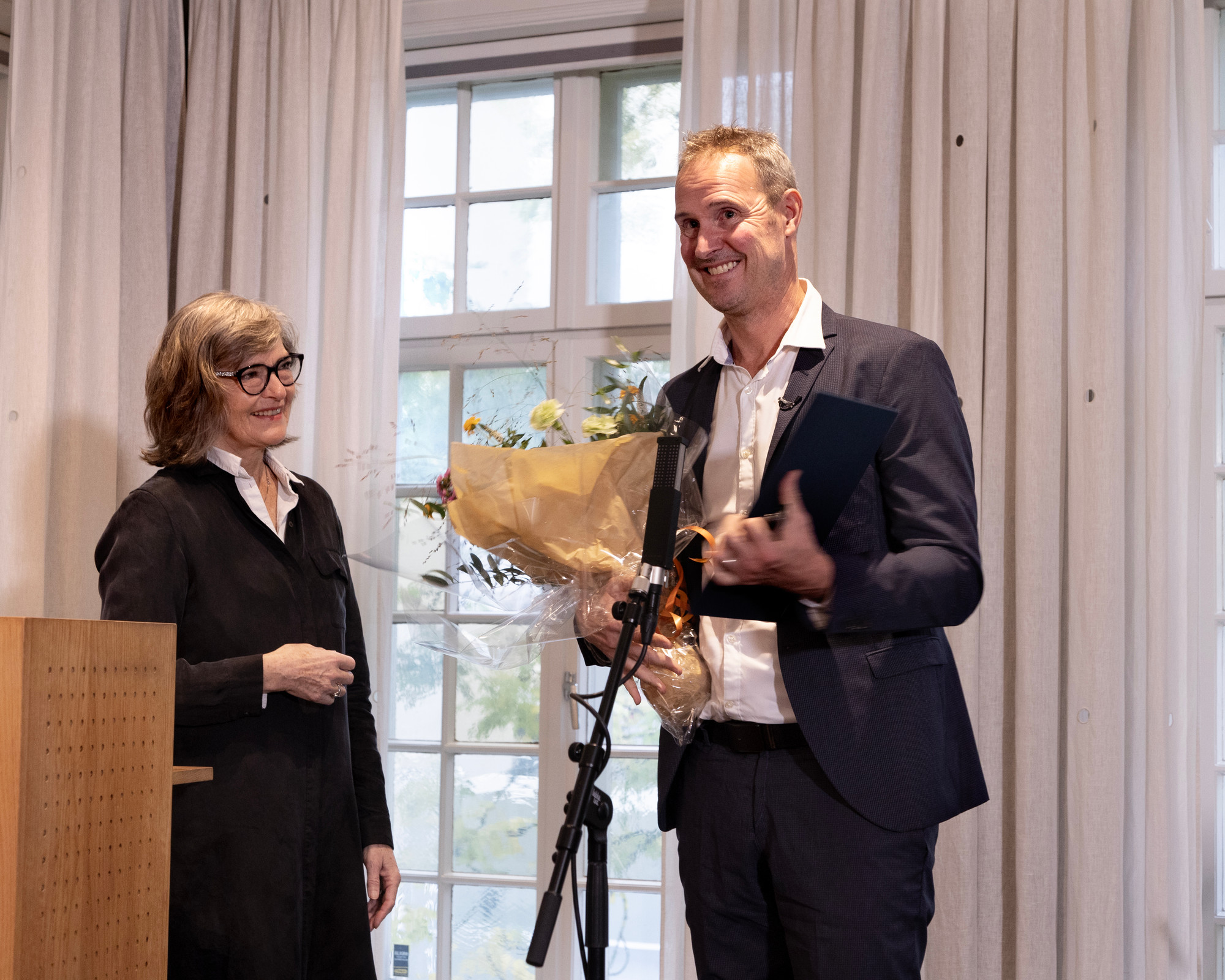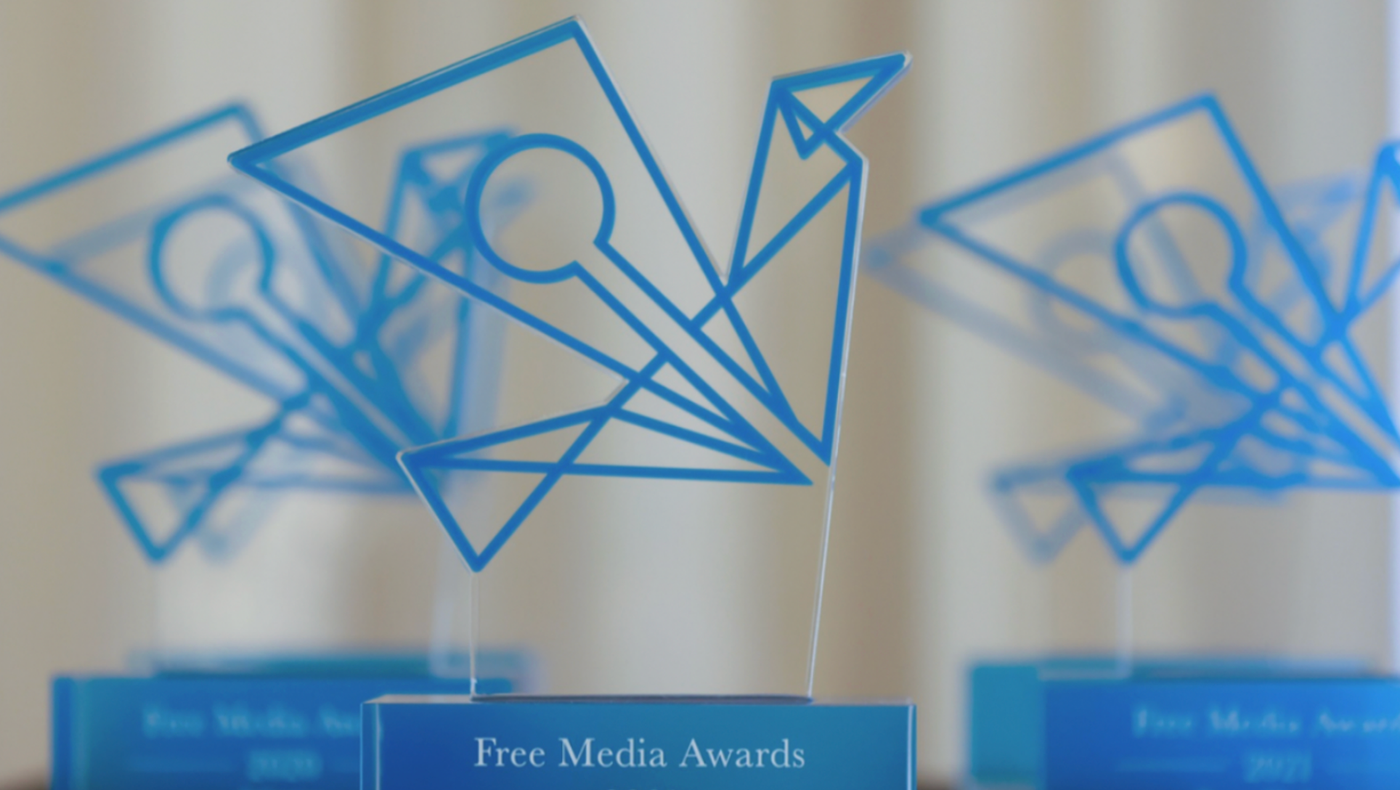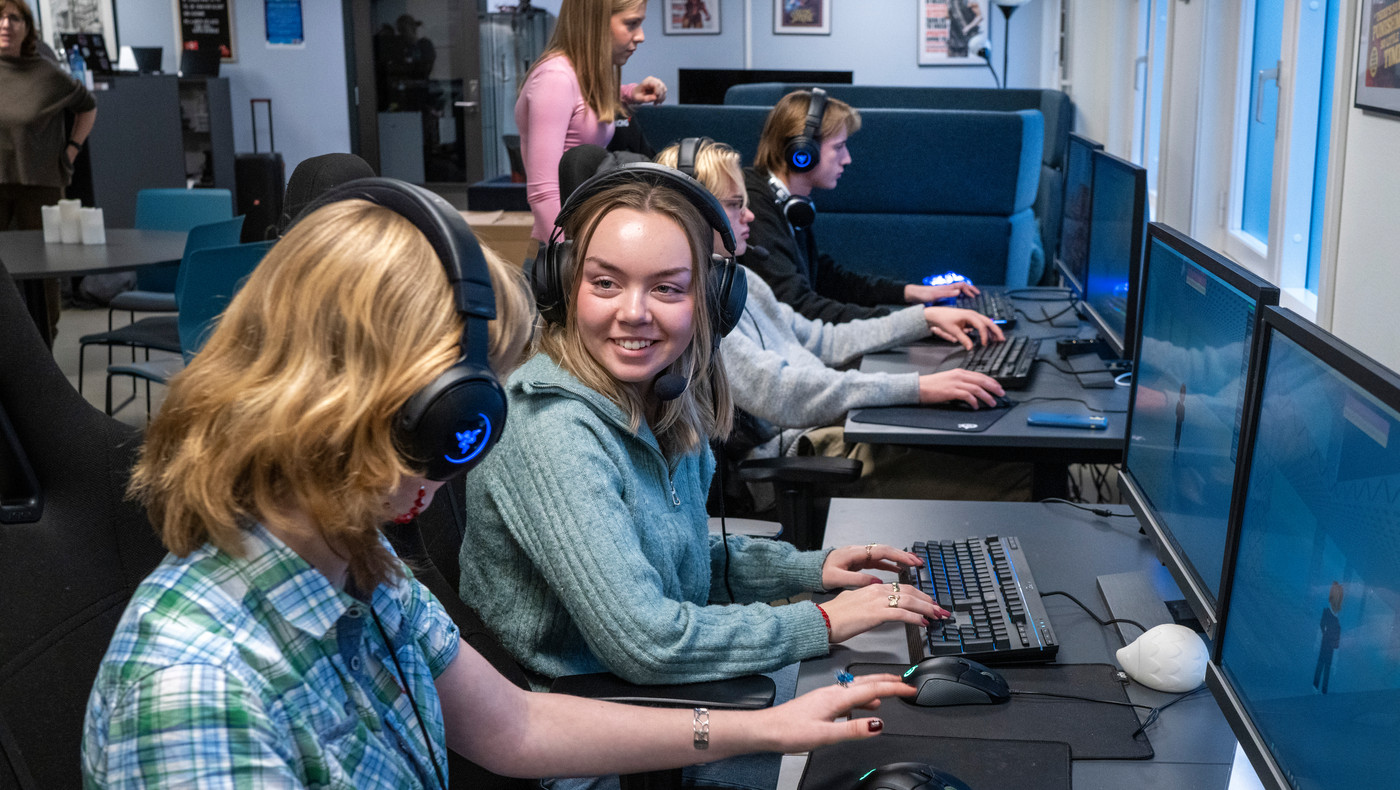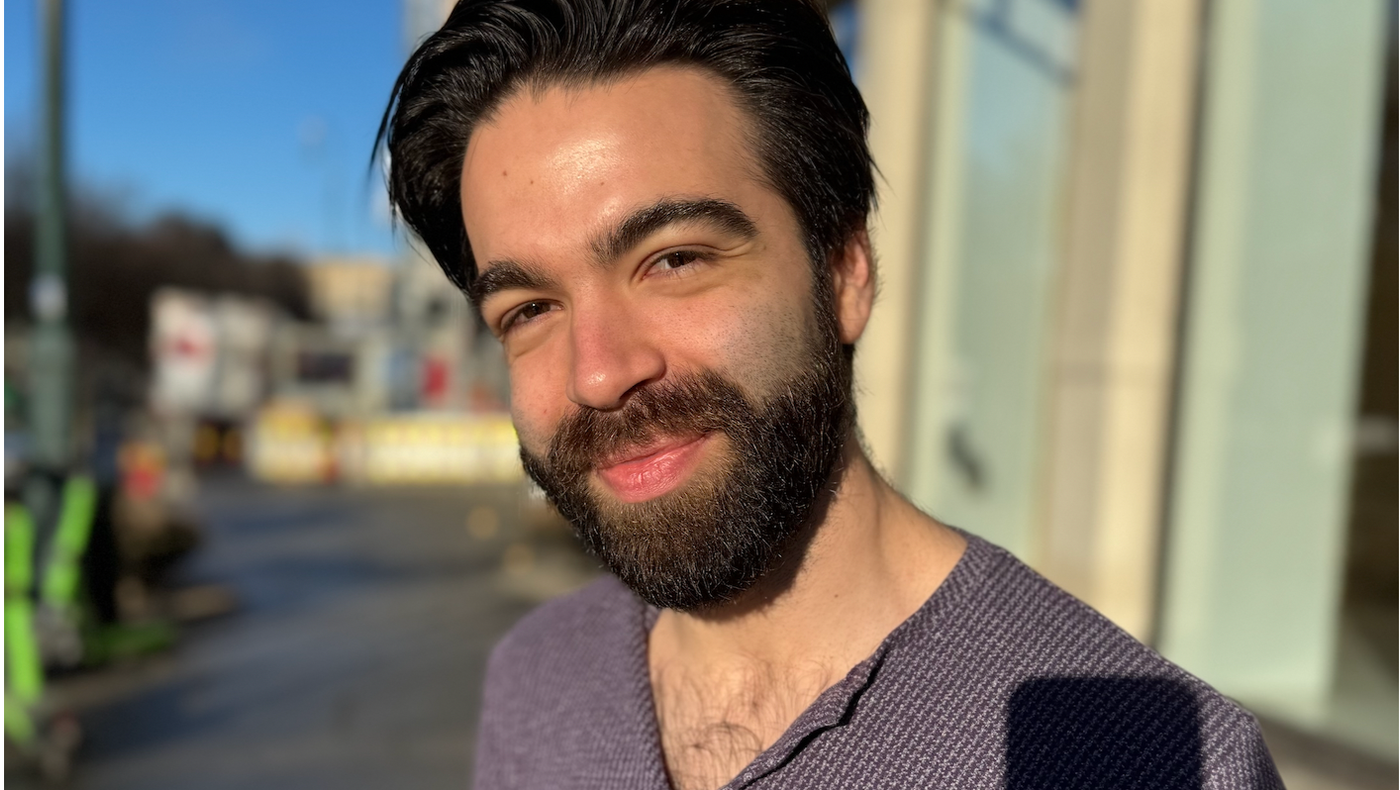Bjørn Olav Jahr: "Facts must always trump emotions"
“Facts must always trump emotions,” stated author Bjørn Olav Jahr when he received the Fritt Ord Tribute on Monday.
The journalist and author was awarded the tribute for thorough and persistent journalism that has uncovered a miscarriage of justice in the Baneheia case and contributed to a preliminary conviction in the Birgitte Tengs case.
“I’m very proud, most of all because I’m receiving the award for having contributed to finally overturning the profoundly unreasonable compensation judgment that hung over Birgitte Tengs’ cousin for 24 years. And because Viggo Kristiansen is now both acquitted and cleared of the murders in Baneheia in May 2000," Jahr added.
“Bjørn Olav Jahr is critical when he asks questions, he is critical when he analyzes. Rather like a wolverine, he doesn’t stop until his teeth feel bone,” said the Fritt Ord Foundation’s Sigrun Slapgard when she presented the award to Jahr on Monday.
Slapgard said that Jahr had earned the Fritt Ord Tribute for the sum total of his tenacious investigative reporting and the collective body of his work that has had “a direct impact on major cases in modern Norwegian history”.
Jahr criticised the police, the prosecuting authorities, the court, the experts and the media. Referring to Viggo Kristiansen, who has now been found innocent of murder, he said that the hesitation on the part of the powers that be to delve more deeply into the issues “has been suffocating”.
Only one journalist, Dagbladet’s Eivind Pedersen, stood up for Viggo. Otherwise, there was a frightening consensus that the police, the prosecuting authorities, the experts and the court simply could not be wrong.
Bjørn Olav Jahr (54) has written the books Who murdered Birgitte Tengs? A criminal documentary" (2015), The Baneheia Murders. Two Stories. One Truth (2017) and The Lawsuit against Viggo Kristiansen (2021), and he has made podcasts and TV programmes about the cases.
Read the full grounds for the tribute to Bjørn Olav Jahr when it was announced.
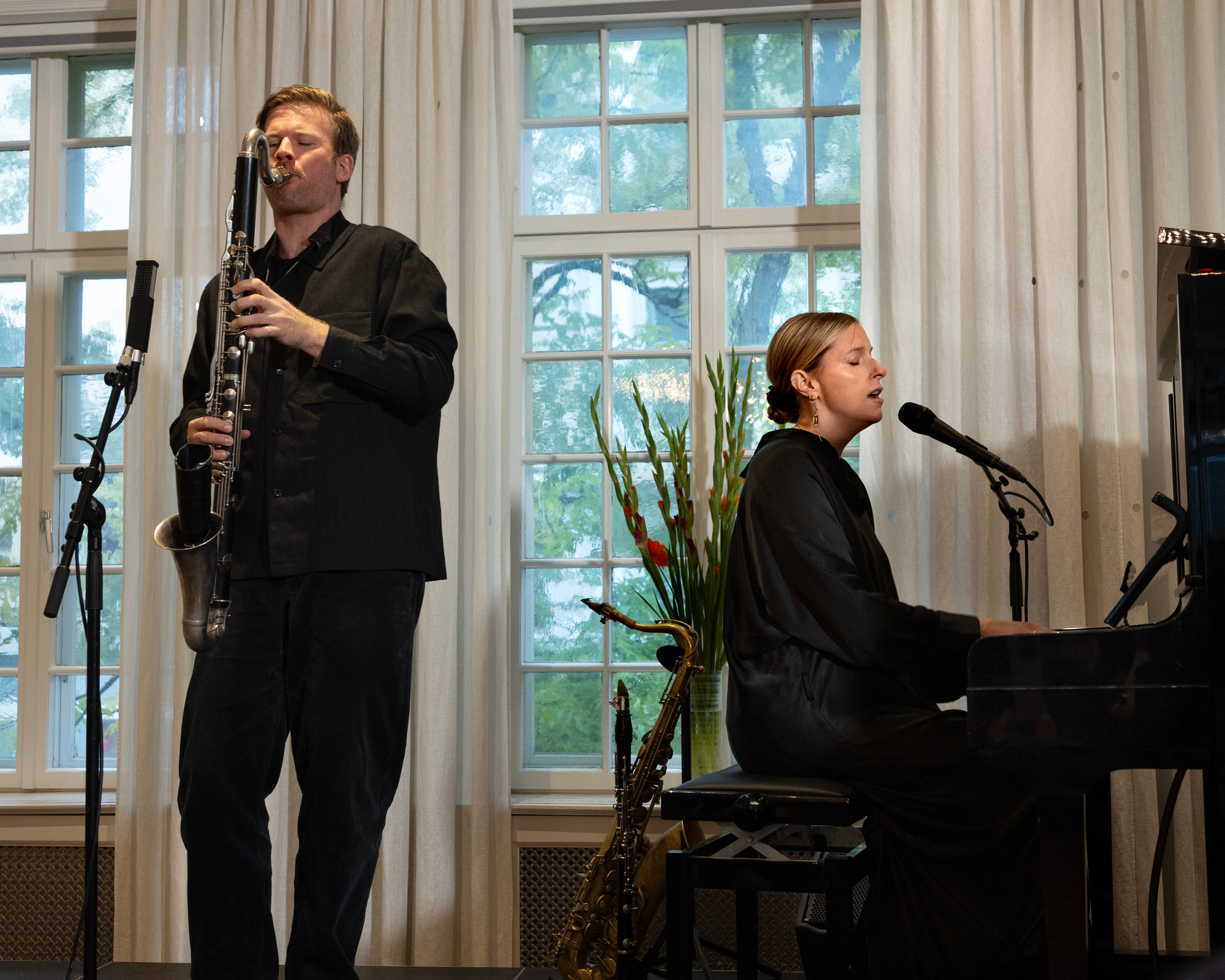
Bjørn Olav Jahr
Acceptance speech: Fritt Ord Tribute, 25 September 2023
Thank you very much for this award. It’s a great honour. It makes me very proud. Most of all because I’m receiving the award for having contributed to finally overturning the profoundly unreasonable compensation judgment that hung over Birgitte Tengs’ cousin for 24 years. And because Viggo Kristiansen is now both acquitted and cleared of the murders in Baneheia in May 2000. So, I’ll start with Viggo and with Birgitte’s cousin. These are the two people I have to thank the most. For their courage, for never letting injustice break them and for the fact that they have both placed their trust in me by talking to me and allowing me access to the case documents; such trust has been absolutely necessary in order for me to be able to inform the public about the cases. Understandably, they wanted that. It is hard to imagine anything worse than being unjustly accused – and not least convicted – of taking someone’s life. I’m glad that more and more people are recognising the value of me drawing attention to the injustice to which these two young men were subjected.
In all modesty, I think that today’s award is also a great victory for free speech. I would like to mention some of those who have paved the way for me. My former employer, Gyldendal, which allowed me to publish Who killed Birgitte Tengs?, the Fritt Ord Foundation and the Norwegian Association of Non-Fiction Writers and Translators that supported me financially, Filmhimmelen and TV 2 that further refined my work on the TV documentary series “Who killed Birgitte?” and local journalists who welcomed me with open arms and shared crucial information that could potentially provide answers to who killed 17-year-old Birgitte. I am indebted not least my two most important sources: Jakob, the father of the cousin, who has fought a heroic battle all these years to clear his son’s name. Always ready for a chat, never afraid to get immersed in demanding material. Then there’s Grete Strømme, the former secretary from the Haugesund Police Station who, as early as the year after Birgitte’s murder, raised an alert and compiled a comprehensive report on the man who had been convicted of the murder earlier that year. For doing that, Strømme was harassed and prosecuted. Nevertheless, she continued to fight for the cousin’s rights. Her civil courage is difficult to describe in words.
I had to get deeply involved in the Baneheia case to experience anything like that type of resistance. Fortunately, I was not as alone as Grete Strømme had been. Or as alone as the couple Sten and Vibeke Ekroth were when they fought for the innocence of the Fredrikstad man Per Liland in the 1970s. I was lucky to have people around me who had enough determination and courage to get my unpopular, controversial and – for many – harsh findings published.
It starts with Viggo Kristiansen claiming his innocence. And one simple, open-ended question: What if he’s right? Pitch, a small start-up publisher, asks this question. Then they ask me if I want to write a book about the murders in Baneheia. And then when, after reading the case documents, I become convinced that Viggo is right, that he is innocent, the publisher Wenche Haugsand says to me: yes, go ahead and write it, then.
So simple. So clear. So liberating.
The Baneheia Murders was published in autumn 2017. Two stories. One truth. Energising and exciting to write. Energy draining and demanding to publish. Two weeks after the launch, I was invited to Vennesla, just north of Kristiansand, for a cultural event called ‘Books, food and talk’. Prior to the event, the local newspaper confronts the organiser, John Terje Ruenes, pointing out that many people find it to be reprehensible to invite me, so they are wondering if they should consider cancelling their visit. Ruenes replies that he understands those reactions very well.
I can’t say that it felt good to be a thought of as reprehensible. At the same time, something good came out of it because the organiser nonetheless dared to invite me, the reprehensible one. “We choose to trust that the publisher and the author are genuinely interested in the rule of law, and we believe it is important for Norwegian society that court decisions be reviewed,” Ruenes replied.
So simple. So clear. So liberating.
The event was largely boycotted and set a sort of all-time-low box office record, with only 40 tickets sold. Nevertheless – and most importantly – the organiser did not allow himself to be stopped by threats of a boycott or by the general atmosphere in southern Norway, which could generally be described as ‘now we have to put this matter behind us once and for all’, i.e. keep quiet, an attitude that had been adopted by all the major media houses in Norway.
Because the fear of getting involved has been suffocating. The Baneheia case is odious. Ten-year-old Lena Sløgedal Paulsen and eight-year-old Stine Sofie Sørstrønen, two innocent little girls, were killed in broad daylight in a popular hiking area near the city of Kristiansand. No wonder everyone demanded answers as to who and why. When the police, after finding public hair belonging to Jan Helge Andersen, arrested both him and his friend Viggo Kristiansen, Norwegian media houses never looked back. “Caught” was the headline on the front page of the newspaper VG the next day. Kristiansen never had a chance. Looking back, only one journalist, Dagbladet’s Eivind Pedersen, stood up for Viggo. Otherwise, there was a frightening consensus that the police, the prosecuting authorities, the experts and the court were infallible. At the same time, there was also enormous sympathy for the bereaved, who had suffered an unimaginable loss. That was completely understandable, but it didn’t mean that you couldn’t have two thoughts in your head at the same time. It didn’t mean that you can’t ask the question, or at least listen to those who dare to do so: What if Viggo is telling the truth? What if he is innocent?
Fortunately, Viggo met a psychologist in prison, Atle Austad, who really listened to him, and who dared to pose these questions. Austad subsequently put him into contact with attorney Sigurd Klomsæt. In spring 2008, Klomsæt began working on Viggo’s retrial, but he would soon be referred to as a clown. When Klomsæt asked for the girls’ clothes to be handed over for new DNA analyses, the media attacked him for desecrating the dead girls and their relatives. Klomsæt engaged the renowned DNA experts Ragne Farmen and Susan Pope, both of whom torpedoed the premise on which the verdict against Viggo was based, i.e. that there was definitely DNA from two perpetrators in Baneheia. Notwithstanding, the media chose to look the other way. “Stop gorging on stale lawyer food”, wrote Fædrelandsvennen. To the press, it was obvious that they ‘knew’ that Viggo was guilty. Their gut feeling trumped the assessment of the evidence.
On 10 October, the Norwegian Press Association and the Fritt Ord Foundation will present a report on what went wrong with the press coverage. Internal evaluations made thus far suggest that the self-criticism is unlikely to reach unprecedented heights. Some media houses point to the influential Ada Sofie Austegard when explaining their own fear of addressing the issues. Austegard is the mother of the late Stine Sofie and secretary general of the Stine Sofie Foundation. Austegard and the foundation submit legislative proposals, have been successful in several legal policy issues, and have won the Rule of Law Award. "Ministers of justice and attorneys general take Austegard seriously. So do I.
And the newspaper VG”.
“For the record, I am a supporter of freedom of expression in principle – even when it is not to my advantage. Austegard has often highlighted the rights of the bereaved. That’s a good thing. However, on Saturday, 5 November 2018, the agenda was nevertheless perceived as different. Under the heading ‘VG attracts good women’, Austegard posts the comment “The media is responsible for the freedom of speech troll!” in print, where she calls it “very concerning when the media make their channels available for ‘individuals’ one-sided and unbalanced speech’. According to Austegard, a freedom of troll is “someone who expresses themselves with a one-sided perspective, distorting facts, sometimes for their own benefit”. She says that in the Baneheia case, she herself has “had to read articles where actors are repeatedly given column space about evidence that has long since been put on the back burner”, and where truths are constructed. I am among those to whom Austegard is referring. And she doesn’t stop there.
A few months after Austegard’s comment in VG, I was invited to talk about miscarriages of justice at a conference organised by the Tønsberg and Færder Library. Austegard reacts to this, and through Tønsberg Blad, she encourages people to boycott the event “to show respect for those who are left behind and cannot stop the fate of our children from being used for its entertainment value.” In a subsequent post in the same newspaper, she names all library staff members. “It is painful to read that all of you who work at the library are completely uncritical of this new trend for entertainment, and are part of this venture,” writes Austegard. She challenges each and every employee at the library to ask the administration to reconsider the event.
However, contrary to what a number of media leaders have done, Chief Librarian Tone Eli Moseid stands firm in her encounter with Austegard. She refers to the public library’s social responsibility as an independent arena for public discussion and debate, and says that the event is about “challenging the authorities in the legal system, not the victims”. “For the library, freedom of expression is important, especially when literature is the form of expression,” says Chief Librarian Moseid.
So simple. So clear. So liberating.
Then I really feel that someone has my back. The event is held in front of a full house. I think it’s about taking responsibility, also for expressing unpopular, controversial and difficult thoughts. Just as the entertainment channel Discovery did when they chose to broadcast Monster’s sober, dignified and very important TV documentary series “Baneheia. The Battle for the Truth”. This is in contrast to TV 2, which had a similar opportunity, but did not dare take a chance. And NRK, which, during a debate with Ada Sofie Austegard and others in front of a full house at the SKUP journalism conference in spring 2019, promised that they would never make a true crime story about Baneheia.
Finally. There are many people I can and should thank for their help along the path to this award. I would like to mention a few more. Police sergeant and researcher Asbjørn Rachlew gave a lecture on police interrogation methods at the SKUP conference in 2003. Rachlew’s work has revolutionised police interrogation methods. At the conference, he spoke about the pressure to clear cases and the danger of false confessions. This became my inspiration and introduction to the Birgitte Tengs case. Lawyer Arvid Sjødin deserves thanks for giving me access to the documents in both cases. I am indebted to Thomas Bergstøl, Viggo’s cousin, for good conversations and tours of Baneheia. Halvard Sivertsen and Mikkel Tronsrud for their invaluable efforts and wise analysis of the Baneheia case. And my gratitude to all my colleagues at Svarttrost produksjoner, who make it possible for me to make podcasts about the Birgitte and Baneheia cases. On a more private note: Ellen, my love, who has always encouraged me to write and investigate, and who more than anyone else understands the power of books. My mother, who has unreservedly supported me in all my choices. My father, who showed me early on that the majority is not necessarily right, but that it’s about fine honing your arguments to counter them. My sister, Anette, for all the fruitful and insightful discussions about jurisprudence and DNA. Egil, age nine, for his great enthusiasm about skid marks and flashlights that don’t light up. Camilla for all the good conversations about technical issues. And Anja, my youngest daughter, the first reader of the script for Who killed Birgitte Tengs?, and also the first in the family – even before me – to argue Viggo Kristiansen’s case in front of a large audience.
In the fall of 2017, Anja is attending the University of Bergen, where, fortunately, intellectual curiosity counts for more than fear of getting involved. Baneheia is an assignment in her ex.phil programme, and during a joint presentation, Anja shoulders the task of arguing that Viggo Kristiansen neither killed nor raped in Baneheia in the spring of 2000. Her opponent is to argue that he is guilty. Afterwards, Anja can proudly call and say that she won the audience over. Completely. Obviously, because she is good. But even more obviously – in this context – because she has a strong case. And because the audience, young people without prejudices, preconceived attitudes and less exposed to misinformation, can more easily understand the facts of the case.
Because facts must always trump emotions. No matter how distorted a story is. No matter how serious it is. No matter what everyone thinks.
So simple. Thank you.
Sigrun Slapgard:
Award speech: Fritt Ord Tribute to Bjørn Olav Jahr, 25 September 2023
Dear all,
I would like to open with an historical retrospective. Almost 750 years ago, Magnus Lagabøte (known in English as Magnus Lawmender), presented Norway with a national system of legislation, making the country a pioneer in Europe. In fact, Norway was the first country since the fall of the Roman Empire to have a unified legal code. Since then, we Norwegians have liked to think of ourselves as a country with considerable security under the law because the very foundation of our democracy is statutory freedom of speech and a legal system that applies to everyone.
At the very beginning of 2021, a major piece of news disrupted this perception, sending shock waves through the media. The New Trial Commission had decided that Viggo Kristiansen’s case should be reopened. After many attempts from 2008 to 2021, and just as many rejections, a friend told Bjørn Olav Jahr that this change of heart was surprising and obvious at the same time.
The Court of Appeal subsequently decided to release Kristiansen, and the Director of Public Prosecutions and Borgarting Court of Appeal later acquitted him.
But the small comment, ‘both surprising and obvious’, illustrates the range in which non-fiction writer Bjørn Olav Jahr has worked, between what was almost inconceivable in the constitutional state of Norway, and Jahr’s ability and determination to doggedly pursue a goal, and to trust his own findings.
For the investigative journalist Jahr, a clear picture had emerged of a person who had been innocently convicted. With that, he saw the contours of one of the biggest miscarriages of justice in Norwegian history. In the beginning, Bjørn Olav Jahr worked on the basis of a hypothesis, a strong hypothesis. Now, we must accept the fact that a person was convicted on wrongful grounds – even though it may be painful and regretful for many of those involved.
“I would like to congratulate Bjørn Olav Jahr on the Fritt Ord Tribute – and on previous awards: You received your first one from the SKUP jury in 2003, and several others in recent years, including the Grand Prize for Journalism and most recently the Prize for Security under the Law. When those of us at Fritt Ord want to pay tribute to your work, it is for your overall authorship and body of work. You have published several books that have had a direct impact on significant issues in modern Norwegian history, placing you at the centre of one of Fritt Ord’s most important target areas.
Let us take another look back in time:
When the alleged perpetrators in the Baneheia case were sentenced in 2002, Bjørn Olav Jahr was working on a completely different case. He was employed as a journalist for the magazine Kapital, and had written several articles about Finance Credit, a major fraud case that ended with multiple convictions and fines. For someone like you, who studied economics and later became a journalist, this was no doubt an exciting field of study that was a good fit. Your work won you the SKUP prize in 2003, and was published as a book in 2005.
Several years later, Bjørn Olav Jahr started working on two major murder cases, heinous cases that had a powerful impact on public opinion in Norway. One was the murder of 17-year-old Birgitte Tengs, and the other was the rapes and murders of eight-year-old Stine Sofie Sørstrønen and ten-year-old Lena Sløgedal Paulsen. I mention the names in this context out of deep respect for the victims and their next of kin.
In these two cases, Bjørn Olav Jahr’s work as a non-fiction writer and journalist has once again meant that his books have had consequences.
However, his work has not been without setbacks.
The book about the Birgitte Tengs case was published in 2015. In it, Jahr writes about how the police may have placed decisive importance on going after her cousin, and thus failed to pursue other leads in the case. The book contributed to the reopening of the case, and the prosecution of another perpetrator, although it is still unclear whether that case will end in a legally binding verdict.
Jahr has published two books on the Baneheia case, one in 2017 and one in 2021. The books have played a crucial role in revealing that the verdict against Viggo Kristiansen was a miscarriage of justice.
The work of this investigative journalist – and the books in which his work has been presented – stand out as extraordinary examples of how meticulous journalistic research can lead to new insight into serious cases, and how they may even change the views of the police, the courts and the press, thus safeguarding due process. We sometimes find it easy to take the rule of law for granted in this country – and perhaps that has been the case ever since the time of Magnus Lawmender.
Jahr’s books – and not least the commitment behind them – are unusually good examples of how important factual prose is. He demonstrates thoroughness, he works independently, he studies an enormous body of documentation. These are the main methods, in addition to interviews and cross-checking, that allow the weighing of various factors. His books give the reader access to the methods and assessments as the stories unfold.
It is the power of the thorough, written material in these books that convinced us. Bjørn Olav Jahr managed to change public opinion in Norway.
In the preface to “The Lawsuit”, his latest book from 2021, he himself raises the question of whether it is possible to combine burning commitment with objective journalism. His conclusion is yes, even though a journalist will always have his own opinions and views.
Objectivity and neutrality are the goal of both the method and the approach. A good journalist cannot succumb to the temptation to ignore facts and circumstances that weaken the hypothesis.
Bjørn Olav Jahr also reminds himself of these important principles along the way. They apply not only to the police and other investigators and researchers, but also to him as a journalist.
In the same foreword, he also asks: “Can I justify writing books about a case that hurts so many people?”
Again, Jahr cuts straight to the heart of the matter. Heinous major crimes may have resulted, directly or indirectly, in pressure to find a perpetrator. At worst, such pressure can lead to erroneous conclusions.
Speaking for himself, he answers the question of whether it is emotionally difficult to work on such murder cases: “I get more involved than upset. The grief belongs to the bereaved. It would almost be disrespectful to enter into it, fooling yourself into thinking that you could take some of it on your shoulders.” This clarification of his role has certainly been necessary and correct in his work, and it strengthens Jahr’s credibility. He has also managed to keep a low profile, thus preventing himself from detracting from the severity of the cases.
Many have asked the question: How can you be so sure that Viggo Johansen is innocent? Bjørn Olav Jahr has answered that question by saying:
“I am always much more afraid to say that someone is guilty than that someone is innocent. If someone asks me how I can be so confident in Viggo Johansen’s innocence, I say that the evidence indicates that he did not do it. When it comes to the question of guilt, there is even more evidence.”
In this way, he points to – and reminds us of – what is, and should be, the basis of our society in which the rule of law prevails.
The journalist’s role – and perhaps privilege – is that he or she does not need to have all the answers. Bjørn Olav Jahr never claimed that he did. But as he made certain discoveries, a picture emerged, and he has stood by it.
The format of his books is characterised by facts, interviews and legal documents that speak their own language. In short, concise chapters, he builds up suspense for the reader. This is non-fiction at its finest, as I see it. In contrast to what is often the case in light fiction, the reader is left with an intense sense that the driving force behind the narrative is a desire to see things with new eyes, bringing out new arguments and perspectives.
When the Norwegian Association of Non-Fiction Writers and Translators created and launched a checklist for ethics in non-fiction, Bjørn Olav Jahr was one of the five non-fiction writers who compiled the list. The difficult cases he has taken on have drawn attention.
Jahr also uses his commitment to inspire others, giving talks at schools, to journalists and in other contexts. This has led to TV productions, and he is currently working as a journalist for the podcast company Svarttrost.
Today, we are celebrating you, but as mentioned earlier, the road to get here has had its setbacks. At a certain point, it probably felt like you were facing a unified press corps, and perhaps also a unified public opinion. You have mentioned that the work on the Baneheia case came at a high cost to you.
In an article in the journal Prosa earlier this year, literary scholar Line Norman Hjorth wrote that your books can be read as an invitation “to acquire a more critical, self-examining eye”.
We have recently been reminded once again that Norway’s ‘society of trust’ can have its flaws, and mistakes are constantly being made – even at the top.
While having a critical, self-examining eye is a journalistic goal, it is also something we must strive for in many aspects of life.
Bjørn Olav Jahr is critical when he asks questions, he is critical when he analyses. Rather like a wolverine, he doesn’t stop until his teeth feel bone. And sometimes he turns his critical gaze on himself, asking whether he has remembered to maintain the neutrality and objectivity that he expects from others.
For the sum total of this tenacious investigative work, Bjørn Olav Jahr has earned the Fritt Ord Tribute.
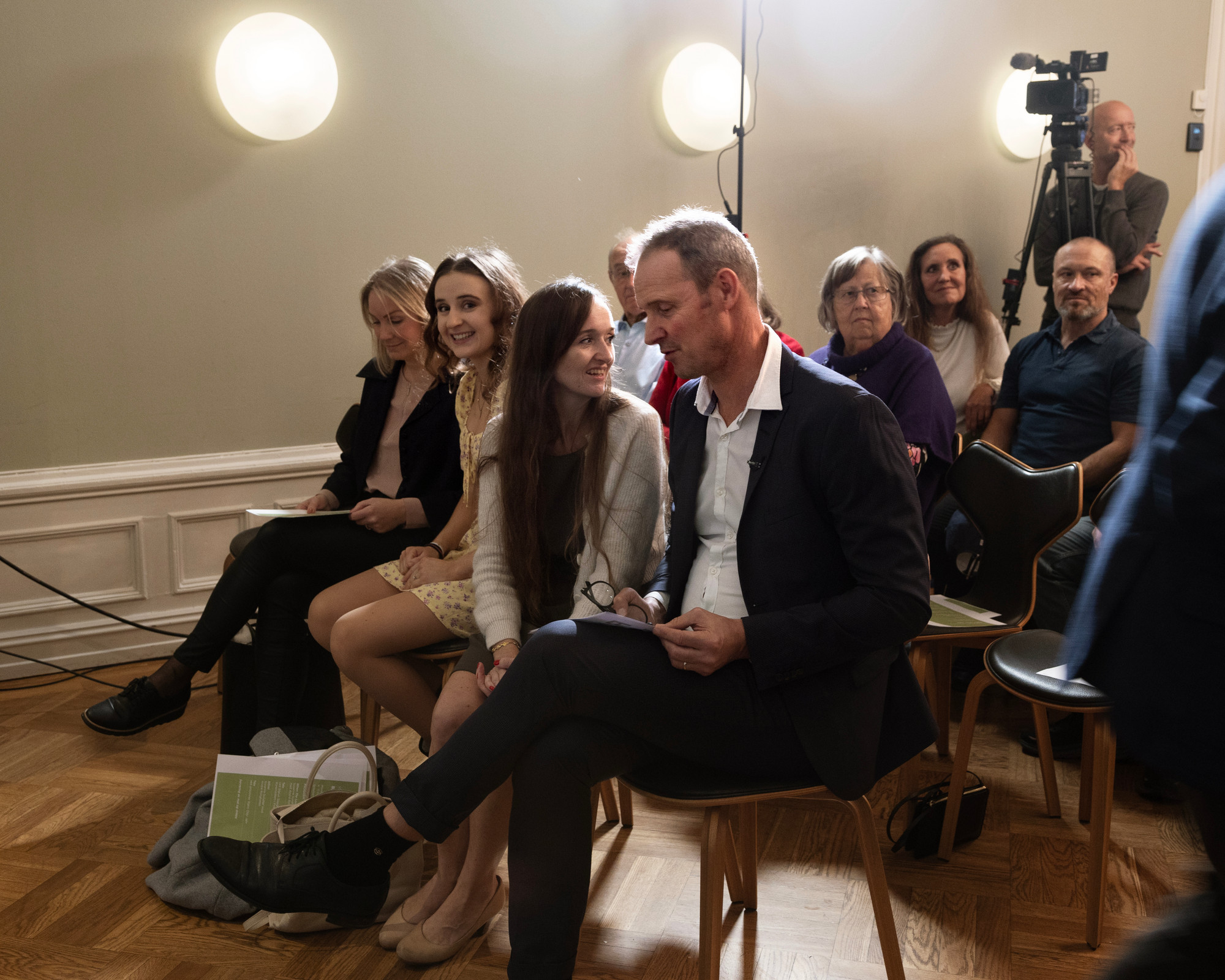


Les mer på Fritt Ord
Read the" grounds for the Tribute awarded to Jahr":/en/pages/1210-fritt-ord-foundation-tribute-to-bjorn-olav-jahr
These have previously received the Fritt Ord Tribute
